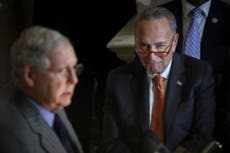Don’t expect another Covid stimulus check by Christmas
Most Americans received a $1,200 direct payment in the spring, and lawmakers are intent on eventually re-upping that programme
Americans should not expect another round of stimulus checks from the US Treasury to hit their bank accounts before Christmas, as yet another work week in Congress kicked off with no discernible path forward on a bipartisan agreement on coronavirus relief.
Senate Majority Leader Mitch McConnell, Speaker Nancy Pelosi and their respective communications staffs have spent the last several months cooking up new ways to denigrate each other for holding negotiations hostage.
Democrats have sought a comprehensive package while Republicans are urging them to take up “targeted” bills for specific programmes on which there is a strong record of bipartisan agreement — small business loans and direct payments for everyday Americans, to name just two.
“[Democrats'] all or nothing obstruction backfired. Democrats did not pick up seats in the House, but instead appear to have lost seats. They have not gained any leverage. They have lost leverage,” Mr McConnell said in a speech on Monday opening up the Senate floor for business.
The majority leader conveniently omitted that Senate Republicans also lost a net of at least one seat in the 2020 election and are in danger of relinquishing their chamber majority if both Democratic candidates in January’s Georgia Senate runoffs defeat GOP incumbents Kelly Loeffler and David Perdue.
Last week, Mr McConnell and Senate Minority Leader Chuck Schumer couldn’t even agree on how to characterise their level of engagement in formal negotiations.
In the absence of any movement from party leaders — even as December deadlines approach for Congress to re-up an eviction moratorium, student loan payment deferrals, and federal unemployment benefits — centrists from both parties are making another token effort to reach across the aisle to bust the deadlock.
The bipartisan gang of nine (at least) is aiming to fold additional funding for popular initiatives such as the small business-oriented Paycheck Protection Program into the annual government spending package that is due by 11 December to avert a third government shutdown in the four years of Donald Trump’s term, Politico, and now others, have reported.
Those compromise-hungry senators include Republicans Mitt Romney of Utah, Susan Collins of Maine, Rob Portman of Ohio, Lisa Murkowski of Alaska, Pat Toomey of Pennsylvania and Democrats Mark Warner of Virginia, Chris Coons of Delaware, Joe Manchin of West Virginia, and Michael Bennet of Colorado.
But incorporating such funding into the government spending bill would still undercut Ms Pelosi’s primary point of leverage: The speaker is holding out on the areas of bipartisan agreement in order to secure a more expansive overall coronavirus resource deployment.
Most recently, Ms Pelosi and House Democrats have passed a $2.2trn package, four times more expensive than the $500bn “skinny” bill from Senate Republicans that Democrats filibustered into the dirt.
“Both sides are going to have to compromise. The Democrats aren't going to get what they want with their $2 trillion plan, and clearly the so-called skinny plan that Leader McConnell put out is not nearly enough to provide a bridge,” Mr Warner, one of the nine senators in the aforementioned bipartisan working group, said in an interview with MSNBC on Monday.
The bipartisan House Problem Solvers Caucus tried a similar gambit in September, offering up a $1.5trn Covid relief bill that went nowhere under Ms Pelosi’s gavel.
Most American adults’ bank accounts received a jolt in the form of $1,200 stimulus checks this past spring, one component of the $2trn CARES Act meant to bolster the health care system amid the coronavirus pandemic and an economy that was struggling with record unemployment as a result of regional shutdowns.
While Mr McConnell’s $500bn skinny bill did not include another round of such checks, Republicans have by and large signaled they are open to re-upping that programme when an actual compromise appears within reach.
Join our commenting forum
Join thought-provoking conversations, follow other Independent readers and see their replies
Comments




Bookmark popover
Removed from bookmarks